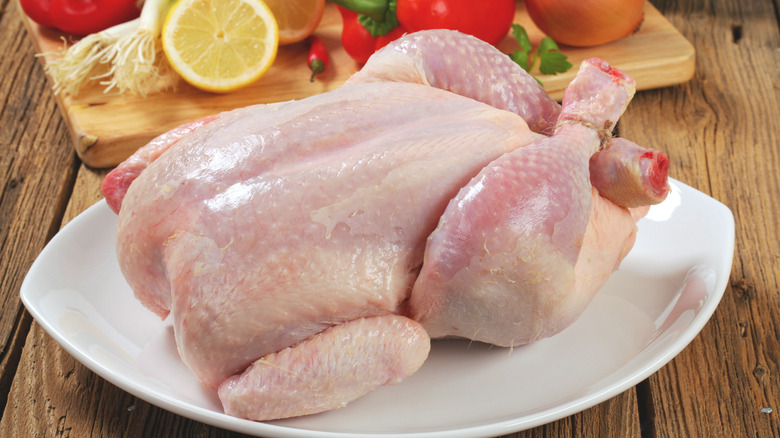What To Do If That Supermarket Chicken Smells Funky
Americans love chicken; we consume more of it on a total poundage basis than any other country. But since it's so ubiquitous and readily available, and we purchase it so often, there's a good chance you've had chicken go bad at least once in your life — even chicken that seems, according to the expiration date, like it should still be fit for consumption. And as with any other meat, the most likely way you'll be able to tell something isn't right with your poultry is if it doesn't smell right.
If your chicken smells funky, there's a good chance it's gone bad. So what should you do in this situation? How do you handle it when your chicken smells off? Thankfully, this is not one of those questions with a complex answer, because your course of action here is pretty simple: Don't eat it and throw it out immediately.
Should you eat chicken that smells off?
Okay, should you chance it and just eat chicken that doesn't smell right? Again, no — absolutely not. Do not do this. If it were possible for text to have actual volume, rest assured this would be a good time for it: Do not eat chicken that seems like it might be past its prime. Like undercooked chicken, spoiled chicken can play host to an array of harmful bacteria, and it could kill you. Don't eat it.
There's one caveat here, and it's this: If it's a brand new vacuum-sealed package and it has explicitly a slightly sour smell, you should give it half an hour before determining whether it's bad. If the smell has dissipated by then, it was almost certainly just lactic acid build-up in a well-sealed package, and the meat is safe to eat. Meat that's gone bad isn't going to suddenly stop smelling bad after it's been out for a bit.
If you're sure the chicken isn't good, though, you might be able to return it to the grocery store, depending on when it was purchased. Most grocery stores are willing to work with meat that's returned the same day it's purchased.
Expiration dates are not the be-all, end-all
It's tempting to rely on an expiration date — it gets at the very human desire for simple answers — but it's equally important to take more time to make sure food is safe because people believe a lot of myths about expiration dates. Expiration dates aren't scientific; they're basically just a company's guesswork about when a product will no longer be at its optimal taste. There's also no regulation surrounding them, and the whole concept of sell-bys is essentially the culinary Wild West. There's a reason there's a growing push to get rid of – or at least clarify — them.
This makes sense when you think about it; it's not like food goes bad with the speed of someone flicking a light switch as soon as the clock strikes midnight on the appointed day. Sometimes, this means food will still be good well past the expiration date — but sometimes, it means the opposite, and food will have gone bad before it.
How can you tell if the chicken is bad?
Should you fully ignore the expiration dates on your chicken? Of course not; they can give you a general idea of when the food was packaged and sold. But they're only one tool to determine meat freshness, and you shouldn't rely on them and them alone. The good news is you can use your senses to tell whether food has gone bad. Again, smell is the most operant sense here, but it's hardly the only one. Chicken that's no longer safe might be slimy to the touch or simply look wrong, possessing a visibly unsettling gray-greenish hue.
Take your senses seriously here because they'll tell you what you need to know. If any of the indicators that your chicken isn't safe for consumption are present, don't risk your health; just throw it out and buy a different package.



